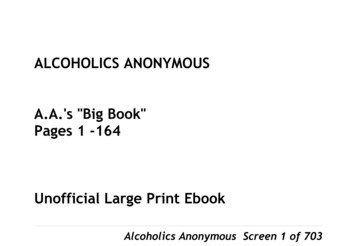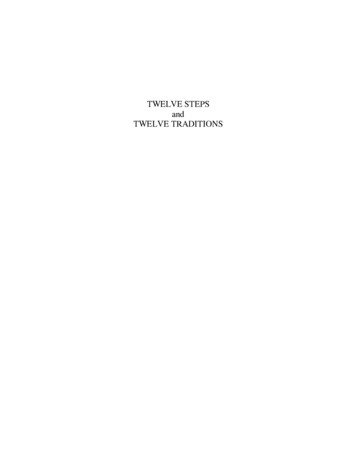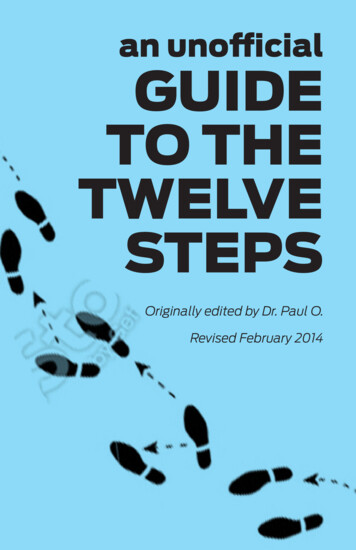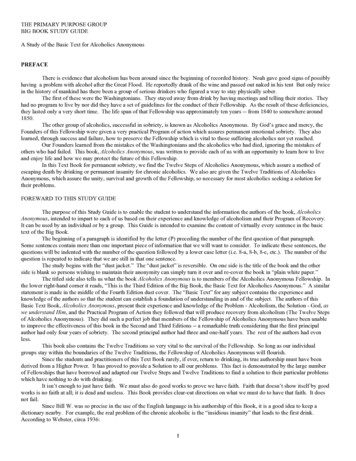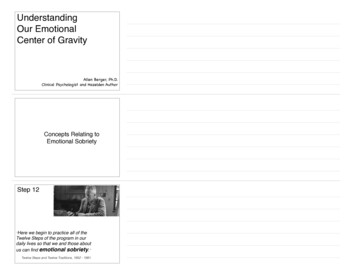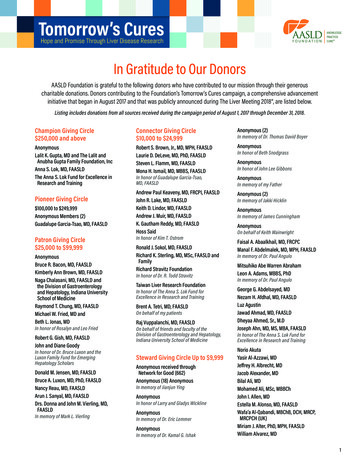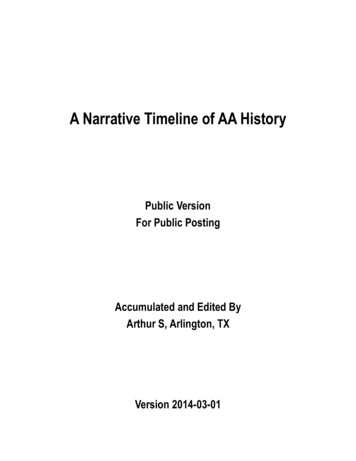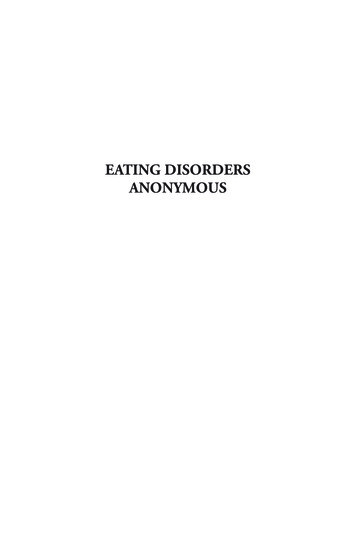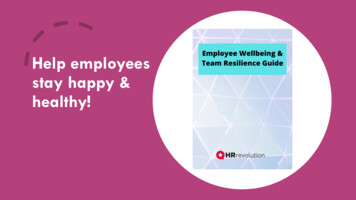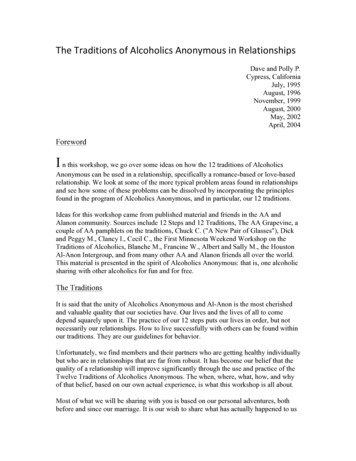
Transcription
ave and Polly P.Cypress, CaliforniaJuly, 1995August, 1996November, 1999August, 2000May, 2002April, 2004ForewordI n this workshop, we go over some ideas on how the 12 traditions of AlcoholicsAnonymous can be used in a relationship, specifically a romance-based or love-basedrelationship. We look at some of the more typical problem areas found in relationshipsand see how some of these problems can be dissolved by incorporating the principlesfound in the program of Alcoholics Anonymous, and in particular, our 12 traditions.Ideas for this workshop came from published material and friends in the AA andAlanon community. Sources include 12 Steps and 12 Traditions, The AA Grapevine, acouple of AA pamphlets on the traditions, Chuck C. ("A New Pair of Glasses"), Dickand Peggy M., Clancy I., Cecil C., the First Minnesota Weekend Workshop on theTraditions of Alcoholics, Blanche M., Francine W., Albert and Sally M., the HoustonAl-Anon Intergroup, and from many other AA and Alanon friends all over the world.This material is presented in the spirit of Alcoholics Anonymous: that is, one alcoholicsharing with other alcoholics for fun and for free.The TraditionsIt is said that the unity of Alcoholics Anonymous and Al-Anon is the most cherishedand valuable quality that our societies have. Our lives and the lives of all to comedepend squarely upon it. The practice of our 12 steps puts our lives in order, but notnecessarily our relationships. How to live successfully with others can be found withinour traditions. They are our guidelines for behavior.Unfortunately, we find members and their partners who are getting healthy individuallybut who are in relationships that are far from robust. It has become our belief that thequality of a relationship will improve significantly through the use and practice of theTwelve Traditions of Alcoholics Anonymous. The when, where, what, how, and whyof that belief, based on our own actual experience, is what this workshop is all about.Most of what we will be sharing with you is based on our personal adventures, bothbefore and since our marriage. It is our wish to share what has actually happened to us
and what we really did rather than what we think - the emphasis being on experiencerather than opinion.IntroductionPolly and I were married on October 27, 1980. We each believe we have the mostwonderful mate in the world and we hope you feel that way about yours (or will whenyou get one). We are, however, not each others first spouse. I have been married threetimes before Polly and she once before me. All of these marriages inexorably grounddown into dreary failure. Neither of us knew how to conduct a relationship with aspouse - or anybody else for that matter. What was the problem? The problem was, wewere alcoholics - selfish and self-centered. Being selfish and self-centered does notmean that we thought well of ourselves - it means that we thought only of ourselves.We became restless, irritable, and discontented when we didn't get our way. We werecontinually frustrated at not knowing what our role as a spouse was or should or couldbe. We believed in quid pro quo as a way of life. We believed that life was situationaland conditional. Rarely were any of our expectations met. Perhaps most importantly,there was not the slightest trace of unselfishness and spirituality in our approach toromance, marriage, children, or stepchildren. If our marriage, indeed our lives, wereever going to work, we had to change.We set about our redemption in several ways. For example, we tried psychotherapy:There seem to be underlying pockets of distrust in psychotherapy in AlcoholicsAnonymous. While this is not the place to fight that war, the Big Book seems to berelatively clear on the matter. On page 133, it says:"Now about health: A body badly burned by alcohol does not often recoverovernight nor do twisted thinking and depression vanish in a twinkling. We areconvinced that a spiritual mode of living is a most powerful health restorative.We, who have recovered from serious drinking, are miracles of mental health. Butwe have seen remarkable transformations in our bodies. Hardly one of our crowdnow shows any dissipation." "But this does not mean that we disregard humanhealth measures. God has abundantly supplied this world with fine doctors,psychologists, and practitioners of various kinds. Do not hesitate to take yourhealth problems to such persons. Most of them give freely of themselves, that theirfellows may enjoy sound minds and bodies. Try to remember that though God haswrought miracles among us, we should never belittle a good doctor or psychiatrist.Their services are often indispensable in treating a newcomer and in following hiscase afterward."Earlier in our marriage, we tried psychotherapy, individually and as a couple. We nowunderstand that part of our motivation was one that we think is fairly routine in AA.We wanted to be on the fast track to Realized Ultimate Reality Sobriety. When we arein the early stages of recovery, we naturally become impatient for more, more, faster,faster. We have come to understand that there is no fast track and we have abandonedany such hopes. Sobriety seems more like having a faucet drip water on the tonguerather than having someone shove a fire hose in your mouth.
Our experience with psychotherapy had mixed results. Generally speaking, it informedbut did not really heal. That is to say, it helped us understand ourselves better. But thenis that, after all, not its promise? We have become now peaceful with that idea. Godheals. Psychotherapy informs and can open the door to healing. Another way of statingour belief is that therapy is occasionally helpful -- Alcoholics Anonymous isindispensable.The information we received from our intercourse with psychotherapy was mostly abroader and more complete understanding of the nature of men and women and howthey differ sexually, intellectually, and behaviorally. This understanding has allowed usto relax our tight unrealistic expectations of each other. We have dropped ourrequirements that each of us acts in a way that is really not attuned with our sexual,psychological, and gender-based nature. It has allowed us to abandon many Old Ideas.Fortunately, we found Alcoholics Anonymous and we have changed. AA has aprogram for living in a way that lets us enjoy our lives. We have been using it for overtwenty-five years and it continues to work.We both freely and happily admit that everything we know about how to conduct arelationship with another human being was learned in Alcoholics Anonymous. It is thatinformation that we share with you now.Some Characteristics of AA: Our Traditions in ActionWe are an inclusive organization - not exclusive. We pride ourselves on saying,"whenever anyone anywhere reaches out for help, I want the hand of AA always to bethere". All alcoholics are welcome as members - everybody else is welcome at openmeetings. Our third tradition states that the only requirement for membership is adesire to stop drinking. Tradition Three states, "The only requirement for AAmembership is a desire to stop drinking." Here are two examples of why this Traditioncame about:December 5, 1941From the Executive Committee of the Los Angeles Group of Alcoholics AnonymousDear Mrs. Irma L.,At a meeting of the Executive Committee of the Los Angeles Group of AlcoholicsAnonymous held December 4, 1941, it was decided that your attendance at groupmeetings was no longer desired until certain explanations and plans for the future weremade to the satisfaction of this Committee. This action has been taken for reasonswhich should be most apparent to yourself. It was decided that, should you so desire,you may appear before members of this Committee and state your attitude. Thisopportunity may be afforded you between now and December 15, 1941. You may
communicate with us at the above address by that date. In case you do not with toappear, we shall consider the matter closed and that your membership is terminated.December 11, 1946To Mr. Burton R. (a member of AA in Colorado Springs, CO.)My Dear Friend,This is to advise you that one Bob W. who claimed to be a very good AA member hasasked to appear before the Denver Group 1 Committee to defend charges unbecomingan AA member. The Committee found him guilty. All seven members voted forexpulsion. He claimed unfairness of the Committee and asked to be heard before theentire group. Request granted. The final vote was 31 for expulsion and two against.Since we no longer have him with us, we look forward to less friction and moreharmony at our club. Mr. K. has advised me of a request by Mr. W. to join him in asocial drink. We are very sorry that occurred and assure you that all of us regret it verymuch. Trusting to have the pleasure of having you with us in the very near future, Iwish to remain sincerely yours.Source: Wally P.And it is not just OK with us that you are here - we want you here. We go everywherelooking for you: asylums, hospitals, jails, detox and treatment centers. You are evenwelcome you if you come drinking (as many of us did).We demand nothing - our steps of recovery are suggested - never demanded. And youare free to totally ignore all our suggestions without forfeiting your membership. AA isessentially free. We have no money or property. If we did, we would just squabble overit. The general service board, working with our auditing firm, decides what our prudentreserve should be and all our bills are net 30. We are debt free, we own no property.In addition to routine alcoholics, we have neurotics, psychotics, sociopaths, thieves,liars, cheats (all by our own admission), Bleeding Deacons and Traditions Lawyers , allof whom are convinced that they represent the true spirit of AA and are each and everyone of them is willing to die for their way.Many of us have an astonishing willingness to practice medicine, law,psychotherapy, and other professions - despite our complete lack of education andcredentials in any of these areas.AA has an ad hoc self-appointed internal group that I call the REA, RulesEnforcement Authority. This flies in the face our ideas regarding no leaders -- onlytrusted servants, and our inspired concept of traditions, not rules. These self-appointed
skinheads of sobriety make sure that every last nuance of all agreements made atbusiness and group conscience meetings are codified into a set of rules that cry out forenforcement. Then they happily go about enforcing their rules, making sure thatnobody saves extra seats (Seat Police), parks in the wrong spot, or eats cookies at thewrong time. We happily coexist with their ministry.Bill Wilsons Family Reunions -- recently in Minneapolis, San Diego, Seattle,Montreal -- feature tens of thousands of mixed cultures, races, ethnic origins,nationalities, and social strata all of whom are laughing, smiling, doing the wave,hugging, tolerating, being courteous and friendly. This is not an accident.What makes all this possible? How do we achieve a Minneapolis? How do we toleratemisguided members? How can we stay united and focused? Was it always this way?Three QuestionsLet me ask you three questions:1. Do you think the idea that alcoholism is a disease originated with AA?2. Do you think AA is the first to have effectively dealt with alcoholism?3. How has AA been able to last (so far)?Assume the Position . . .We offer what we intend to be a fairly strong position statement: We have anunwavering belief that any successful ongoing relationship (or individual life for thatmatter) must have an underlying set of values or principles by which it is conducted.There are a couple of reasons for this: One is that we have to have something to rely onwhen our lives fall off into the marginal to unbearable area. Any relationship is goingto be assailed from time to time by misfortune: someone will lose a job; a bit of gossipwill float in; illness will come along; financial hardship will strike; a parent will growold and need help. If we don't have a set of values or traditions to get through theserough times, our relationship is at risk. Relationships can decompose under such stress.The other reason is that values and traditions are needed to guide us in the way we treateach other. They characterize what we believe is fair and just. They constitute the "outof bounds" markers where we agree not to drag the other or allow ourselves to bedragged. Values define the rules governing anger and arguments and money andproperty and power and control and all the other things which frequently rankle in arelationship, no matter how close the parties may be or how much they love each other.What values are we talking about? The values we refer to are fidelity or loyalty,commitment, honesty, integrity, fairness, equity, virtue, and the meaning of love.Without values, there is no morality. If there is no truth, there are no lies.We are going to spend the next few pages briefly looking at the history of the
traditions: There is a point to be made here that is very important.A Touch of HistoryAbout 1796, a doctor named Rush (who by the way was a signer of the Declarationof Independence) wrote a paper describing alcohol abuse as a disease. The namealcoholism was not yet invented and the disease concept of alcoholism did notoriginate with Alcoholics Anonymous. Dr. Rush explored the subject in some depth inhis paper but few, except those who delve into the history of AA ever heard of him orhis paper.Later, around 1840 when the temperance movement was thriving, there were a halfdozen or so alcoholics in Baltimore who drank together every day in a local tavern .One day, while discussing the temperance movement, it was decided that they shouldcheck it out. With true alcoholic wisdom, they decided that only one of them need togo and he could then report his findings back to the group. The report had an impactand from that arose a movement called the Washingtonians. Within six months, therewere several hundred members and within a few years, there were thousands. AbrahamLincoln spoke at one of their gatherings so they were successful and accepted insociety without any kind of stigma. Remember, AA was formed in 1935 and by 1940,when the Big Book was written, there were only about 100 members.Around the turn of the century, another movement got started called the Emmanuelmovement. This was a religion-based movement founded by a man named ElwoodWooster in New England and was successful for a time in helping people to get sober.A short time later, the Oxford group got started under a man named Frank Buckman.This group believed in the principles of first century Christianity, that is, one Christiansharing with another. No grand edifices, no liturgy, no costumes - just simpleChristianity as they understood it. If you recall, the Oxford movement was quitesuccessful. Roland Hazard and Ebby Thatcher were members and it was essentially theOxford Group credo that both credited for their sobriety. When Ebby visited BillWilson in Townes Hospital, it was the message of the Oxford Group that he carried. Togive you an indication of their size and power, the Oxford Group had a meeting in theHollywood Bowl in 1937. There were 27,000 people in the bowl and another 10,000outside who couldn't get in.All of these movements enjoyed some success. Yet where are they today? They haveall failed in attaining longevity. What happened? It is our belief, and that of manyothers, that they lost their way because they had no guiding principles or traditions.The ever-increasing enjoyment the Washingtonians took in their success and powerbecame such that they felt empowered to address problems other than alcoholism.They also got into politics and social issues.
The Oxford Group, through Buckman, decided to alter the course of the world by"converting" the worlds leaders. Buckman would say, "If I could convert Hitler, I couldchange the course of history." His first attempt at conversion was the Duke of Windsorand it failed - just as his movement was finally to do.Yet AA has thus far succeeded. How? We believe that our survival as a society is noless miraculous than our personal recoveries from a terminal illness. The fact that weare still thriving is due in no small part to the guiding principles of our 12 traditions.Naturally, like true alcoholics, the members of AA resisted their adoption. Bill wroteabout them extensively in the Grapevine back in the mid-1940's but they were not wellreceived. There were times when Bill was asked to speak only on the condition that henot talk about those "damn traditions". Finally, however, in 1950 at the conference inCleveland, the short form was adopted in principle. They have served us well.If you are beginning to suspect that we think relationships should have mutuallyagreeable values and should be based on principles or traditions, you are right. It is ourbelief that when someone is asked point blank what he stands for, that person should beable to tell him. And we are not talking about ones' "philosophy of life", presented inelegant prose nor are we talking about what one "thinks". We are talking about whatone does, and more specifically, what one does when he is alone and nobody iswatching or will ever find out.So how do we integrate a set of principles or values into our lives that we can and willlive by and what should they be? That is the question we are trying to answer in thisworkshop.The right person . . .Perhaps nothing in life is more fun and exciting than a romantic relationship withanother person. Certainly nothing is more painful when it's not working. And nothingis more frightening or feels more emotionally hazardous than facing uncertainty whenyour heart is on the line. So we admire your willingness to take that chance.Some of us approach romance or marriage as though it were a game of some sort.Many of us think the trick is to find the right person. Actually, the trick is to be theright person. So the question is not: Is he/she the right person? The question is: Am Ithe right person? Does my attitude, behavior, and appearance attract the kind of personthat I would like to have with me?How would an accurate ad in the personals column read if you were seeking a mate?For many alcoholics, it might go something like periodswithoutinteractivecommunication
nceaplus.My question then is this: Would you want to have a relationship with anyone whowould answer such an ad? Are you the right person? This workshop is therefore meantto encourage you be the right person - not fix your partner.A change in perspectiveWe need to take a look at some common negative or undesirable feelings and try tofigure out how to change our perspective. To make a fundamental shift in perspective,we must first take some kind of action. Unless we do something, nothing will change.And the something we do is frequently going to be contrary to the way we feel. It istypically against our "better judgment". However, action will change the way we thinkwhich will, in turn, change the way we feel.As you have probably heard many times, we cannot think our way into good living.We must live our way into good thinking. This means that we must do something - notthink something. If we want self-esteem, we must do estimable things.not thinkestimable thoughts. If we want respect, we must be respectable. We must act in arespectable manner, not think in a respectable way. We must try to remember that weare what we repeatedly do - not what we repeatedly think. We are judged by our wordsand our deeds - not our intentions.We will also need to take a look at the baggage we bring into our relationships. Wehave a friend who says that all emotional baggage must fit under the seat. We all haveit. It is important therefore to stop and consider the conscious and unconsciousbehaviors we display in our everyday lives that came from our families, friends , andprevious relationships. So we need to ask ourselves: What baggage do I bring into myrelationships? It comes from many areas of our lives: nfoodorthewayitisprepared*waystodothings- ndgroups- cusationsoflaziness,stupidity,orincompetence
iticalparent"Badhabits/goodhabits- ersoftheoppositesex.In addition, many of us are either alcoholic or have been exposed to alcoholism andthere are behavioral symptoms to examine there as well. For example, many of us werealways afraid to be seen as we really were. We were afraid of being laughed at. Wewere afraid of ridicule. We were afraid of humiliation. We were afraid of rejection. Inother words, we viewed ourselves as victims. This is a load to carry into a relationship.Such attitudes are not only incapacitating to the individual, in the sense that they exerta powerful negative force on our lives and affairs but they are distasteful to our matesas well. My mate doesn't want to have a partner who is emotionally crippled.All of these things help determine our nature as individuals. What else can we expectour nature as alcoholics to be? :selfishnessandself- u.happinessisamodeoftravel,notastateofbeing.Over and above such learned behavior, there are also other differences:Men and Women are different. Beyond the obvious physical and hormonal differences,they differ as well in the organization of their thoughts and emotions. Recent findingssuggest that women's experiences, thoughts, and feelings do not pass through an"intellectual" filter. They do not think, "how should I feel about this" as men so oftendo nor or they as frequently confused about how they feel as men are. It appears thatwomen have a direct physical connection between sensory and emotional areas of theirbrain that is simply not there in men. Science is suggesting, in other words, that wemen can never think like a woman or feel like a woman. Thus our old-fashionedcommon sense is finally being underscored by scientific proof.So, after all of this teeing up, lets go through the traditions and see how we may applytheir underlying ideas to our relationships. The traditions are sort of like the AA torah.They are the precepts of AA or the embodiment of values for which AA stands. Andnotice that they are called "traditions" - not "laws" or "rules". We all know how far wewould get if we tried to impose laws or rules on alcoholics - bloody mutiny. But whatis important is the underlying "spirit" of these traditions and that is what we want tolook at.
The Twelve Traditions in Relationships:1. Our common welfare should come first. A healthyrelationship depends upon difeachonecaresfortherest,thereisOneMind."- ‐- willautomaticallyexperiencetheseresultsalso.Unity means that the two of us make one whole. Ask yourself: Do I think of mypartner and myself as a unit? Our book says that selfishness and self-centeredness are,we think, the root of our problem. Are you selfish or self-centered with respect to yourmarriage or relationship? Do you think in terms of our house, our cars, our bankaccount, our dogs, our furniture? Or do you think in terms of my car, my money, myphone, my stuff? If you are thinking mostly about yourself, you are not likely to have arelationship with another person that will bring you joy and happiness.We have had couples ask us about money. Money is, or should be, uncomplicated anda sign of unity is how infrequently money is a topic of heated discourse in your house.Polly and I have a joint bank account. It contains ALL of our money. Whenever eitherof us comes into possession of money, we put it in our bank account. From that bankaccount, we pay our bills and then share the rest. During any given period, she may geta little more or a little less than me but we believe that over any long period, it worksout even. The problem I most often see is that one or both people are afraid they arenot going to get their share (more if possible) so they watch and sneak and try todeprive and ultimately fight and haggle. If there is 100.00 to share, you have a 50.00problem. To solve it, worry about your partners 50 instead of your own. Doeverything you can to make sure your partner gets their 50.00. The problem willdisappear.Several years ago, a friend and I were discussing how much fun it would be to take amonth off and go to Nepal and hike up to Everest base camp. I told Polly about it that
night when I got home. She did not say what about me. She did not say how much willit cost. She did not say what will I do. She immediately said, "Why don't you go". Weencourage each other to follow our passions and because of that, neither one of us everfeels cheated.Unity begins with each individual. Having a solid relationship with a Higher Powerwithin is vital to expressing unity in a relationship. If you are following the guidanceand will of God, as you understand him, you are more able to participate in a healthyloving relationship. Why? Because a working relationship with God provides faith andfaith removes fear. Unity requires harmonious cooperation. Unity demands awillingness to listen to the ideas, feelings, and opinions of the other with an open mind.Unity means sharing views and not insisting on promoting our own way as the onlyway.There are at least three areas in a relationship where I believe there must be union: Theintellect, the emotions, and the genitals. There should be attachment in all three areas.You should find your partner intellectually stimulating, emotionally attractive, andsexually enticing. Polly is my rock and that is a very unifying characteristic. I admireher. I like her. I think she is beautiful and even sensual when she wants to be. She isfun to be with. She doesn't give me a lot of attitude. I learn a lot from her. It amazes mehow easily she does some things that are so difficult for me. She is very trusting,generous, and non-judgmental; qualities that enrich her life and the lives of those abouther. She is bright, has a nimble mind, and a lot of enthusiasm for life.Unity cannot automatically preserve itself. Like personal recovery, we shall alwayshave to work to maintain it. Here too, we need honesty, humility, open-mindedness,unselfishness and, above all, vigilance. So we must ponder carefully the experienceothers have already had of trying to work and live together. Relationships can go onbenders sstrong."- ‐- isions.CHECKLIST FOR TRADITION 1:
ible strength is better than inflexible. Let the storm flow over you, and thenpop back up." ndulg
Ideas for this workshop came from published material and friends in the AA and Alanon community. Sources include 12 Steps and 12 Traditions, The AA Grapevine, a couple of AA pamphlets on the traditions, Chuck C. ("A New Pair of Glasses"), Dick and Peggy M., Clancy I., Cecil C., the First Minnesota Weekend Workshop on the
